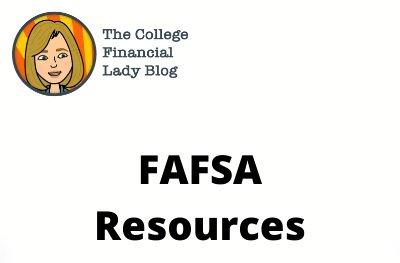Featured
The new Simplified FAFSA is here! Here’s a quick video with some tips that will help you get through it with a minimum of chaos and maximum of financial aid. 🔗
Most recent posts
Highlights
Categories
The FAFSA & CSS Profile
Saving for College
Paying for College
Student Loans
Application Process
Miscellaneous
All blog posts
FAFSA 2022-23 EFC Formula Guide
The FAFSA becomes available onOctober 1, but you can download the EFC Formula Guide to see how the sausage gets made in advance. Here are some suggestions for how to use this data.
Your College Research List
Families getting started on the college search process are well-served by keeping a list of schools that the student is interested in. (This should be the student’s job, by the way.) But what does that list look like? What goes in it? Read on for suggestions.
What Year? 2021 Edition
Families who will file the FAFSA this fall should know what dates matter for which data inputs. Income is prior-prior year (meaning most recently filed tax return), assets are “day of” and then there’s the matter of education tax credits such as the American Opportunity Tax Credit.
Test Optional, Test Blind and What Am I Supposed to Do?
Clearly, test-optional admissions are here to stay, with more than 1,600 four-year colleges offering test-optional admissions for the fall. More than 80 others are test-blind for the 2021 admissions cycle, according to FairTest’s online database of testing policies.
Changes to the FAFSA
Summary of changes coming to the FAFSA in 2022 stemming from the roughly 170 pages of the 2020 year-end omnibus federal spending bill that were devoted to FAFSA Simplification.
Podcast: College Financial Literacy
In my latest podcast episode, he walked me through some of the key pieces of college financial literacy. His wisdom is available here on Spotify, or wherever you get your podcasts.
How Much Can You Contribute to a 529?
How much can you contribute and how much should you contribute?
How to Start Saving
It’s back-to-basics week for me and time to talk about getting started saving for college. If you want your children to go to college, you need to save. Period. That’s the easy part. Harder is where and how much.
New Year’s Resolutions for 2021
Has there ever been a year as hotly anticipated as 2021? And among all the new year’s resolutions to get back to living our best lives as soon as we can– travel, time with friends and family, in-person school– might I suggest some resolutions for families of college-bound children? I’ve divided them by age range to make it easy for you to pick a few that are appropriate for your family.
To all the Sophomore Families
If you’re a parent of a high school sophomore (or younger) and reading this, congratulations! Today you’re going to learn some things you can do that will benefit you far more on the FAFSA than the last-minute moves families can make just before filing the FAFSA.
EFC Formula Guide for the 2021-2022 FAFSA
The FAFSA won’t be available until Oct. 1 but in the meantime you can download the EFC Formula Guide for the current year and calculate your Expected Family Contribution.
Preparing for the FAFSA
A lot of people ask about how to prepare for the FAFSA. Doing the FAFSA is a lot like doing your taxes. You can absolutely wait until April 15 to fill out your 1040, but you’ll probably save some money by thinking about your taxes in the fall and taking some steps before the end of the year to mitigate the bill.
Do AP and IB Classes Save Money on College?
High schools and others often promote AP, IB and dual credit classes as a way to save money on college, and for some students that’s certainly true. These classes have plenty of benefits other than saving money; however, I’m all about saving money on college so that is what I’m writing about.
Budgeting for Books and Supplies
When comparing the two schools my son is considering, we noticed an interesting data point: one school estimated books and supplies to cost $800 annually; the other $1,146.
FAFSA Asset Do’s and Don’t’s
It’s the busy season for insurance and annuities hucksters who tell parents of college-bound students that spending their assets to buy an insurance policy will yield all manner of financial aid benefits. Before you start making expensive moves that end up costing more in the long run, you should figure out what will really benefit you.






















It’s tax time, which means it’s time to claim education tax credits you may be eligible for. Unfortunately, a lot of tax software programs don’t provide good instructions for doing so. Here’s what you need to know.